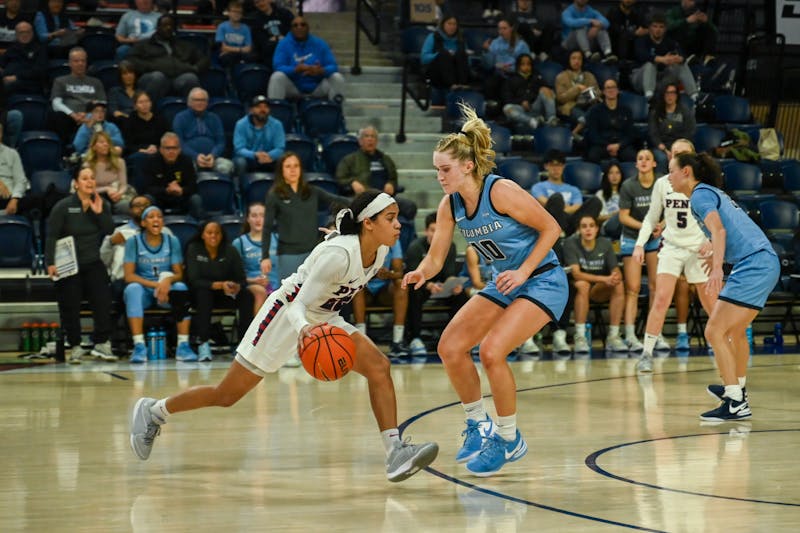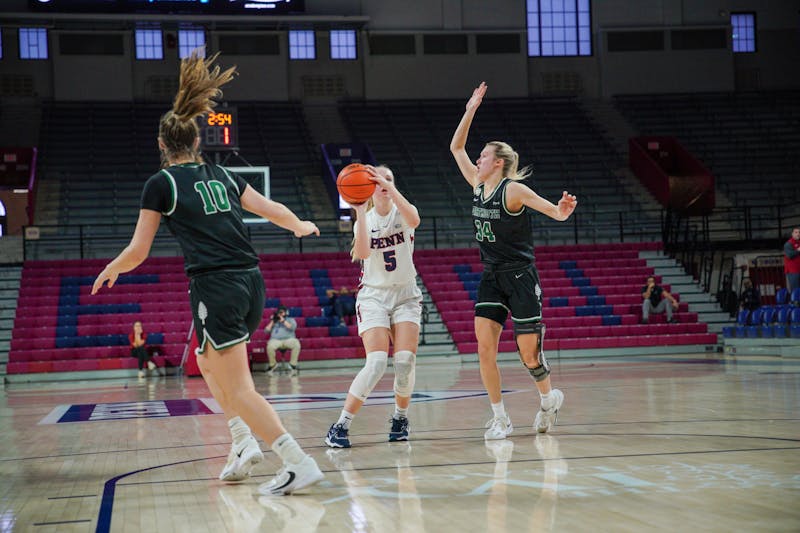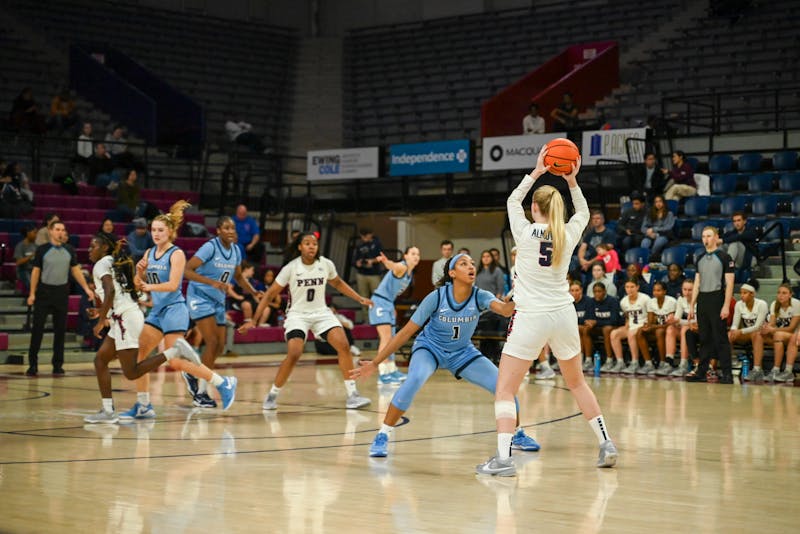
Malaya Ulan, the 2024-25 Youth Poet Laureate of Philadelphia, speaks at the 2025 TEDxPenn conference on March 29.
Credit: Connie ZhaoTEDxPenn held its annual conference at the Annenberg Center on March 29, inviting nine speakers to examine pivotal moments in their lives.
TEDxPenn is the largest student-run TEDx event in the country. The event drew around 250 community members from Penn and the Philadelphia area to the Zellerbach Theatre in the Annenberg Center.

Perelman School of Medicine professor David Fajgenbaum was the event opener and discussed his journey of healing and action. Fajgenbaum specifically discussed his battle with Castleman disease, specifically when he was told there was “nothing more” that could be done. He then decided to take control of his own survival.
“I realized that hope alone is not enough,” Fajgenbaum said. “If I wanted any chance to survive, I would need to turn my hope into action.”
He worked with his own blood samples to repurpose sirolimus, an immunosuppressive drug, to treat his disease. In 2022, he founded Every Cure, a nonprofit organization that uses artificial intelligence to find new purposes for existing drugs.

Malaya Ulan, the 2024-25 Philadelphia Youth Poet Laureate, discussed the role of poetry for both protest and healing. Drawing from her Filipino heritage and lived experiences, Ulan spoke about using writing to reclaim identity and resist invisibility.
“Poetry became my best armor,” she said, explaining how verse helped her confront racism, isolation, and historical erasure.
Inspired by Filipino revolutionary José Rizal in ninth grade, Ulan led a student protest against widespread teacher layoffs in the School District of Philadelphia. Through her activism, Ulan emphasized that poetry is not only a form of personal expression, but also a tool for collective resistance and systemic change.
“With each end of a poem, we leave mic drops, bombs filled with seeds of inquiry,” Ulan said.

Noah Weber, the chief information officer of Olden Labs, shared his vision for transforming animal testing through ethical biotechnology and automation. In his talk, Weber addressed the staggering statistic that 150 million rodents are killed each year in biomedical research, while progress in treating major diseases remains slow.
“Animal research is very archaic. … The same manual procedures we did 60 years ago, we’re doing today,” Weber said. At Olden Labs, he leads efforts to modernize drug development by combining AI, robotics, and genetic engineering to reduce animal use while improving data quality.

University of Pennsylvania Carey Law School Associate Dean and Quattrone Center Executive Director John Hollway delivered his talk on wrongful convictions and the need for systemic reform in the criminal justice system. Hollway highlighted how human error, outdated protocols, and communication failures can align to produce catastrophic outcomes.
“We can’t change the human condition,” Hollway said. “We have to change the conditions in which our humans operate.”
Hollway’s work calls for a structural shift in how the justice system approaches error, prioritizing learning and prevention over blame.

2011 Penn Graduate School of Education graduate Holly Hatcher-Frazier, an educator and former “Dance Moms” cast member, shared a personal reflection on one of her viral moments on the show: “Empty chair: Do a solo.”
“Two truths can exist at once,” Hatcher-Frazier said, acknowledging both the humor and the hardship behind the moment.
She developed an acronym, SOLO, to elaborate on how to shift the narrative of your life: Stay true to yourself, open yourself to an unscripted future, lean into discomfort, and own the opportunity.

Jaime Teevan, chief scientist at Microsoft, explained how generative artificial intelligence is reshaping the way people work. Teevan shared her first experience with OpenAI’s language model in 2022 and the pivotal moment when she realized its potential.
“I screamed, because I felt a huge responsibility to get this technology into people’s hands quickly and to do it the right way,” Teevan said.
She urged the audience to think of AI not just as a tool, but as a partner in reimagining how work gets done.
“The future of work is not about doing more things faster,” she said. “The future of work is about having interesting conversations.”

Cinema and Media Studies professor Peter Decherney, who serves as Penn’s Edmund J. and Louise W. Kahn Endowed Term Chair in the Humanities, spoke about the power of storytelling across cultural and geographic boundaries. For the past seven years, he has worked in partnership with African Jewish communities to amplify their stories, which are often excluded from mainstream Jewish narratives.
“When you tell someone else’s story, you enter the impossible but worthy abyss of trying to understand each other,” Decherney said.
Through photography, film, and long-term relationships, he explains how storytelling can expand both personal identity and global understanding.

Founder and CEO of NALA Benjamin Fernandes speaks at the TEDxPenn conference on March 29.
Benjamin Fernandes, a Tanzanian entrepreneur and founder of a global fintech company, spoke about migration. Reflecting on his own journey from Tanzania to the United States, Fernandes emphasized that migration is not a crisis, but rather “the engine that powers progress.”
He highlighted how migrants not only contribute to the economies of the countries they move to, but also send billions of dollars home, often outpacing foreign aid and becoming a lifeline for communities across the globe.
“Talent is everywhere,” Fernandes said. “Opportunity? Not so much.”

2016 University of Pennsylvania Carey Law School and Wharton School MBA graduate Jett Puckett, who currently works as a company owner and content creator, delivered a talk on the power of love, positivity, and authenticity in a media landscape dominated by negativity.
“In a landscape of fear and anger, love stands out,” Puckett said.
Rather than chasing controversy or spectacle, Puckett and his wife gained national attention simply by sharing their genuine relationship, which he calls “loving out loud.” Encouraging the audience to consume and create more positive content, he reminded the attendees that they have the power to “reshape the world.”
TEDxPenn club, composed of around 40 members across five core teams — Speaker & Content, Operations, Marketing, Design, and Finance — curated the talks from pitch to stage. Club members scouted speakers across disciplines, hosted auditions, and worked one-on-one with selected individuals. When selecting speakers, TEDxPenn considers “if that is an idea worth spreading,” according to Steven Su, a co-curator.
TedXPenn’s 2024 conference, themed “Limits to Infinity,” featured a former president of Peru and Nobel Prize laureate. In 2023, the conference, titled “(R)evolution,” featured an award-winning filmmaker and digital content creator.
The Daily Pennsylvanian is an independent, student-run newspaper. Please consider making a donation to support the coverage that shapes the University. Your generosity ensures a future of strong journalism at Penn.
Donate









